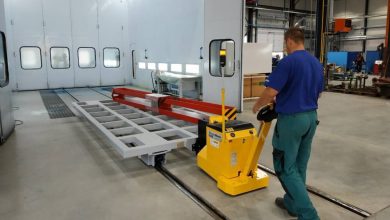Why Modern Businesses Need Logistics Technology with a Strong Focus on Warehouse Management Systems and Software
In today’s fast-moving world, businesses can’t afford delays, errors, or inefficiencies in their supply chain. Customers expect fast delivery, accurate tracking, and seamless order fulfillment. To meet these growing demands, businesses must invest in logistics technology, especially in warehouse management systems and software.
The Role of Logistics Technology in Today’s Business Environment
Logistics is no longer just about moving goods from point A to point B. It’s a complex operation that includes inventory tracking, order management, delivery schedules, storage optimization, and customer communication. With global supply chains and rising competition, manual processes are simply not enough anymore.
Modern logistics technology gives businesses the tools to streamline operations, reduce costs, and enhance customer satisfaction. From real-time tracking to smart automation, businesses now have a competitive edge through integrated systems.
Why Every Business Needs a Warehouse Management System
A warehouse management system is the backbone of any successful logistics strategy. It helps manage daily warehouse operations like picking, packing, inventory control, receiving, and shipping. But more than that, it transforms how businesses handle their goods.
Here’s how a warehouse management system (WMS) benefits your business:
1. Real-Time Inventory Visibility
With a good WMS, businesses can track stock levels in real time. You’ll always know what’s available, what’s low, and what needs to be ordered. This reduces stockouts, overstocking, and lost sales.
2. Improved Order Accuracy
Manual order fulfillment often leads to mistakes. A WMS automates the process, guiding workers with optimized picking routes and barcode scanning. This ensures orders are picked and packed correctly, minimizing returns.
3. Efficient Space Utilization
A WMS helps you organize warehouse space better. You’ll know where each product is, reducing time spent looking for items. Optimizing shelf space also allows you to store more products in the same area, improving capacity without needing more space.
4. Faster Order Fulfillment
Time is money. A smart WMS speeds up operations by automating tasks, streamlining workflows, and reducing manual handling. Your team works faster and smarter.
5. Integration with Other Systems
Many WMS platforms integrate easily with ERP, CRM, and shipping software. This gives you a complete view of your operations from a single dashboard, improving decision-making and coordination.
Transport Management System: Enhancing the Delivery Process
Managing the warehouse is just one part of the puzzle. The next critical step is delivering the products. That’s where a Transport management system comes in. This system ensures that deliveries are made on time, at the lowest possible cost, and with complete transparency.
Key Benefits of a Transport Management System (TMS):
1. Route Optimization
A TMS helps plan the best delivery routes using GPS data and traffic analysis. This saves fuel, reduces delivery time, and ensures timely drop-offs.
2. Carrier Management
Whether you use your own fleet or third-party carriers, a TMS allows you to manage them all in one place. You can compare rates, check availability, and assign jobs based on performance and cost.
3. Real-Time Tracking
With live tracking, you and your customers know exactly where a shipment is at any moment. This transparency builds trust and improves the customer experience.
4. Freight Cost Control
TMS platforms help monitor and control freight expenses. You can identify cost-saving opportunities and ensure you’re not overpaying for deliveries.
5. Improved Compliance
A good TMS helps ensure that your delivery process complies with local and international shipping regulations, including documentation, insurance, and customs.
Combining WMS and TMS for End-to-End Supply Chain Control
The real magic happens when warehouse management systems and transport management systems work together. From the moment a product enters your warehouse to the second it reaches your customer, every step is tracked, optimized, and automated.
Imagine this workflow:
- A customer places an order online.
- The WMS picks, packs, and prepares the item.
- The TMS assigns the delivery to the best available carrier.
- The customer receives live tracking updates.
- The delivery is made faster, and with fewer errors.
This kind of seamless coordination leads to higher customer satisfaction, lower operational costs, and faster growth for your business.
Key Features to Look for in a Logistics Software Solution
Not all logistics technology is the same. When choosing a system for your business, make sure it includes these key features:
- Cloud-based access for easy remote management
- Mobile compatibility so your team can operate on the go
- Automation tools to reduce manual errors
- Analytics and reporting for data-driven decision-making
- Scalability so it grows with your business
- User-friendly interface to reduce training time
Choosing the right partner, like CartonCloud, ensures that you’re not just buying software—you’re investing in a smarter, more efficient future.
Industries That Benefit Most from Logistics Technology
Although logistics tech is useful for nearly every industry, some sectors benefit more:
- E-commerce: With large order volumes and high customer expectations, automation is key.
- Retail: Fast-moving inventory and multiple locations make WMS and TMS essential.
- Pharmaceuticals: Requires strict compliance and accurate tracking.
- Manufacturing: From raw materials to finished goods, the supply chain must be smooth and timely.
- Food and Beverage: Perishable goods require speed, visibility, and tight quality control.
The Future of Logistics is Smart, Integrated, and Data-Driven
The logistics industry is evolving. Artificial intelligence, IoT, machine learning, and cloud computing are becoming part of everyday logistics operations. Businesses that adopt smart logistics systems early will have a clear advantage.
Final Thoughts
In today’s competitive business environment, logistics technology is not optional—it’s essential. A modern warehouse management system paired with an advanced transport management system allows businesses to operate smoothly, cut costs, and deliver a superior customer experience.





